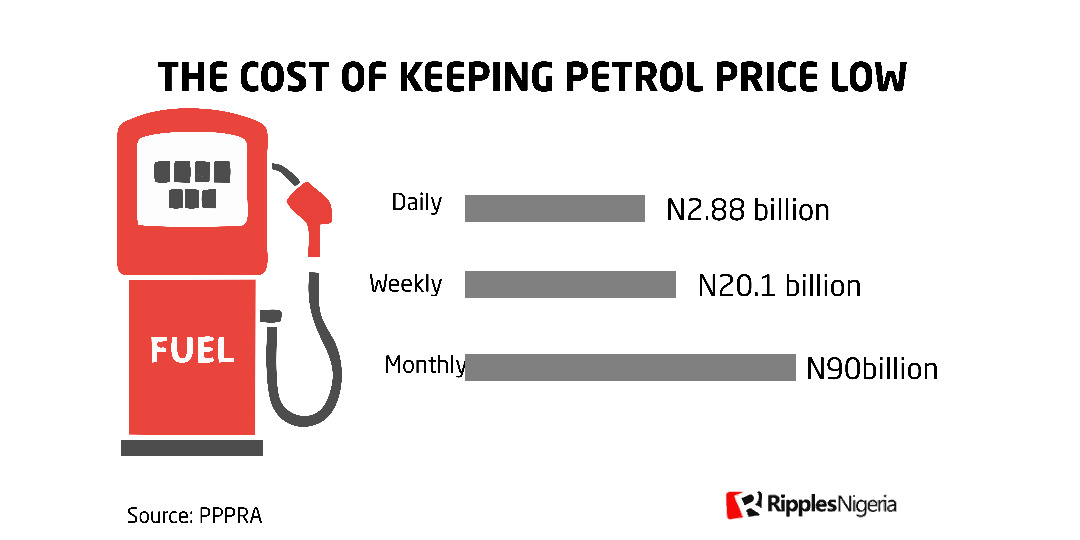Business
Nigeria spends N2.88bn daily to keep fuel price at N162-N171. Here is why

On Friday, Nigerians woke up to the news that the price of petrol in the country has been increased to N212.61 per litre.
The increment was announced by the Petroleum Product Pricing Regulatory Agency (PPPRA) in the petroleum pricing template report published on its website.
But the PPPRA parent company, Nigerian National Petroleum Corporation (NNPC) took to its verified Twitter account to deny the report, backing a promise it had made that there was no price increase in March.
The denial of price increase was also followed by a statement from the Minister of State, Petroleum Resources, Timipre Sylva.
According to Silva the information was “misleading”, and it was unthinkable to raise the price of the product when negotiations were going on with organised labour and urged the general public to disregard such reports.
Soon after the statements from NNPC and the Minister, PPPRA deleted the published petrol pricing template with a follow-up explanation that the deleted price template was only an indicative of current market trends and did not translate to an increase in petrol price.
The statement however did not deny the data from the template.
“Even though market fundamentals for PMS in the past few months indicated upward price trends, the pump price has remained the same” PPPRA noted
READ ALSO: ‘Another fuel price hike a direct invitation to mass protest,’ PDP cautions Nigerian govt
From the deleted template, the expected landing cost of petrol between 1ST and 26th February 2021 was N189.61, excluding N4.03 wholesalers margin, Admin charge N1.23, transport allowance N3.89, bridging fund N7.51, Marine transport average resulting in expected retail price of N212.6, compared to the retained current price of N162-N171 across the country, a clear indicative that Nigeria has returned to the era of subsidy.
The u-turn by the federal government, therefore, means there is a subsidy of N50.6 per litre which translates into N2.88 billion daily subsidy payment, N20.1 billion weekly and N90n billion for the month of March.
Ripples Nigeria got the estimate by multiplying the average daily consumption of 57 million litres with the difference between the current petrol price and the current market trends charge published by PPPRA which stands at N50.6 per litre to the remaining number of days in 2021 from 1st March.
We are already down 59 days, between January and February, which gives 305 days as the remaining days to December for the government to ensure the price of petrol across the country stayed constant at N162-N171.
Recall that Sylva, Minister of State on Petroleum Resources exactly a year ago, insisted that the government no longer subsidised fuel having deregulated the sector. Mele Kyari, the group managing director of the Nigerian National Petroleum Corporation (NNPC) also supported Sylva’s statement that the government was abolishing petrol subsidy.
According to the federal government, the move will allow market forces to determine how much Nigerians pay for petrol to enable the government channel subsidy payment to the development of the country.
As at 9.00 am, Sunday, 14 March crude oil price was at $69.22 per barrel and analyst expected it to hit $80 a barrel this year as demand for the product surges. The Big question is how long can the federal government keep the price low.
Nigeria’s foreign reserves from which oil subsidy payment is paid currently stands at $34.6 billion as at 10th March 2021 a drop of 1.18 billion in just a month when it stood at $35.8 billion on 10th February 2021.
Join the conversation
Support Ripples Nigeria, hold up solutions journalism
Balanced, fearless journalism driven by data comes at huge financial costs.
As a media platform, we hold leadership accountable and will not trade the right to press freedom and free speech for a piece of cake.
If you like what we do, and are ready to uphold solutions journalism, kindly donate to the Ripples Nigeria cause.
Your support would help to ensure that citizens and institutions continue to have free access to credible and reliable information for societal development.

























